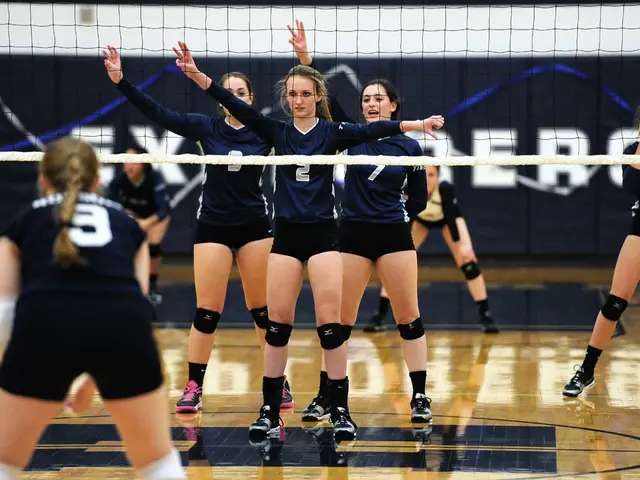Hittin' the Brakes: Sports Betting Ad Limits Gain Steam Worldwide
Voters in New Jersey Advocate for Restrictions on Gambling Advertisements as Australia Reduces Ad Spending in the Gaming Industry
Join us as we delve into the latest trends in sports betting advertising regulations, with a focus on the U.S., Australia, and beyond.
Aussie Sportsbooks Say "No Thanks" to Live Ads
In a move to curtail mounting community concerns, Australia's largest bookmaker, Sportsbet, recently announced it will cease live odds updates during NRL and AFL broadcasts. This significant step comes as part of a 40% reduction in sports betting advertising over the past year, demonstrating the industry's willingness to respond to public backlash.
A Slam Dunk Issue: New Jersey's Ad Limits Crusade
A recent Fairleigh Dickinson University poll revealed that a whopping 76% of New Jersey voters support restrictions on gambling advertisements. Bipartisan support transcends political allegiances, with Democrats, Republicans, and independents uniting against the ad deluge.
"If either party is looking for a slam dunk issue in New Jersey, this is it," said Dan Cassino, executive director of the FDU Poll. "Even the groups most likely to take part in gambling, like young men, seem to be fed up with all of the ads."
The SAFE Bet Act: Steering Towards Ad Regulation
In the U.S., the SAFE Bet Act, proposed by U.S. Sen. Richard Blumenthal (D-CT) and Rep. Paul Tonko (D-NY), aims to tighten the reins on sports betting advertising, targeting live game advertisements and certain hours.
Meanwhile, state-level legislators move towards similar regulations, like New York's proposed ban on sports betting ads between 8 AM and 10 PM and during live sports events. Massachusetts and Illinois are also intrigued by this regulatory wave, proposing measures to rein in sports betting advertising.
The Industry Reacts: On a Tightrope Between Legitimacy and Addiction
While some in the sports betting industry argue that current advertising practices are responsible and help curb illegal betting activities, critics maintain that stronger regulations are necessary to shield vulnerable individuals.
These developments hint at a flourishing trend toward more regulated sports betting environments, influenced both by federal and state-level initiatives.
Advertising Disclosure
Our commitment to providing you with the best independent sports betting news and content might earn us a commission from partners when you make a purchase through a link on our site.
News tags: AFL | Australia | Connecticut | Fairleigh Dickinson University | New Jersey | NRL | PAUL TONKO | Richard Blumenthal | SAFE Bet Act | Sportsbet | U.S. Supreme Court
Michael MolterWith stints scouting college basketball for Florida State University under Leonard Hamilton and the University of Alabama under Anthony Grant, Michael switched gears to focus on NBA content. A graduate of both schools, he now covers sports betting bills, sports betting revenue data, tennis betting odds, and sportsbook reviews. When not glued to the TV watching mid-level tennis matches, Michael enjoys basketball, hiking, and kayaking.
Enrichment Data:
Overall:
Theats to stricter regulations on sports betting advertising are escalating, as highlighted by the SAFE Bet Act in the U.S. and Australia's largest bookmaker, Sportsbet, pulling live odds updates during broadcasts of major sports leagues.
The SAFE Bet Act:
The SAFE Bet Act, proposed by U.S. Reps. Paul Tonko and Richard Blumenthal, intends to rein in sports betting advertising by banning ads during live sports events and specific hours, as well as prohibiting terms like "bonus" or "no sweat" from advertisements and limiting disclosure of information on wagering methods.
[1] Tonko and Blumenthal Introduce SAFE Sports Betting Act (SAFE Bet Act) to Protect Young People | Press Release | U.S. Sen. Richard Blumenthal (https://www.blumenthal.senate.gov/news/press-releases/tonko-and-blumenthal-introduce-safe-sports-betting-act-safe-bet-act-to-protect-young-people)
[2] The American Gaming Association Responds to the Introduction of the SAFE Bet Act (https://news.americangaming.org/americas-casinos-and-gaming-industry-responds-to-the-introduction-of-the-safe-bet-act/)
[3] South Dakota becomes fourth US state to OK legal sports betting | AP News (https://apnews.com/article/south-dakota-sports-gaming-business-sports-betting-ports-16d2eec1122f0948354e38e5fe97e39c)
[4] New York sports betting bill would prohibit ads between 8 am and 10 pm (https://www.usgaming.keydifferences.com/new-york/ny-sports-betting-bill-would-prohibit-ads-between-8-am-and-10-pm/)
[5] Proposed New York sports betting bill seeks restrictions on when betting ads can run (https://www.usgaming.keydifferences.com/new-york/proposed-ny-sports-betting-bill-seeks-restrictions-on-when-betting-ads-can-run/)
- The SAFE Bet Act, drafted by U.S. Senators Richard Blumenthal (D-CT) and Rep. Paul Tonko (D-NY), seeks to tighten regulations on sports betting advertising, notably targeting live game ads and specific hours.
- In Australia, the biggest bookmaker, Sportsbet, has decided to halt live odds updates during NRL and AFL broadcasts, as part of an overall 40% reduction in sports betting ads over the past year.
- A recent poll conducted by Fairleigh Dickinson University revealed that an overwhelming 76% of New Jersey voters support restrictions on gambling advertisements, with the support cutting across party lines.
- In the U.S., similar regulations are being proposed at state levels, such as New York's plan to ban sports betting ads between 8 AM and 10 PM and during live sports events.
- Massachusetts and Illinois are also considering measures to limit sports betting advertising, following a trend towards more regulated sports betting environments.
- Critics argue that stronger regulations are necessary to protect vulnerable individuals from the potential risks of gambling addiction.
- Some within the sports betting industry counter that existing advertising practices are responsible and help curb illegal betting activities.
- The sports betting industry is navigating a delicate balance between maintaining legitimacy and addressing concerns about addiction. Advertising disclosures may impact the recommendations provided in our content.








